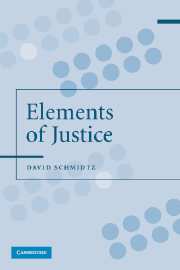Book contents
- Frontmatter
- Contents
- Acknowledgments
- PART 1 WHAT IS JUSTICE?
- PART 2 HOW TO DESERVE
- PART 3 HOW TO RECIPROCATE
- 13 Reciprocity
- 14 What Is Reciprocity?
- 15 Varieties of Reciprocity
- 16 Debts to Society and Double Counting
- 17 The Limits of Reciprocity
- PART 4 EQUAL RESPECT AND EQUAL SHARES
- PART 5 MEDITATIONS ON NEED
- PART 6 THE RIGHT TO DISTRIBUTE
- References
- Index
16 - Debts to Society and Double Counting
Published online by Cambridge University Press: 05 June 2012
- Frontmatter
- Contents
- Acknowledgments
- PART 1 WHAT IS JUSTICE?
- PART 2 HOW TO DESERVE
- PART 3 HOW TO RECIPROCATE
- 13 Reciprocity
- 14 What Is Reciprocity?
- 15 Varieties of Reciprocity
- 16 Debts to Society and Double Counting
- 17 The Limits of Reciprocity
- PART 4 EQUAL RESPECT AND EQUAL SHARES
- PART 5 MEDITATIONS ON NEED
- PART 6 THE RIGHT TO DISTRIBUTE
- References
- Index
Summary
Thesis: Persons are not in debt simply in virtue of being persons in a society. If they are in debt, it will be in virtue of their unique individual histories.
THE DOUBLE COUNTING PROBLEM
A principle of reciprocity sometimes is invoked to ground political obligation (especially an obligation to pay taxes). In the hands of communitarians and nationalists, such arguments begin with the fact that, as Lawrence Becker says, “No one is self-made. Whatever good there is in our lives is, in part, a product of the acts of others.” What is Becker getting at? We might think Becker is about to conclude that while we owe society for what it did for us, we deserve no credit for what we did in return. Not so. In fact, Becker has this to say, in the form of a parable:
I know a man who thinks he lives in debt….
He acts as though he were never, ever, fully entitled to anything. As though good will, and good motives, and conscientiousness on the part of others were never his by right or reason, but always something to admire.
He is grateful to his parents, even though he cares for them in their old age. He is grateful to his employer, and loyal, even though his work is barely noticed. And he is grateful to his country too (the strength of those emotions is embarrassing), even though he's suffered for it.
He is aware of what he does for others. He just thinks that everything he is and has is somehow owed to them. […]
- Type
- Chapter
- Information
- The Elements of Justice , pp. 90 - 93Publisher: Cambridge University PressPrint publication year: 2006



